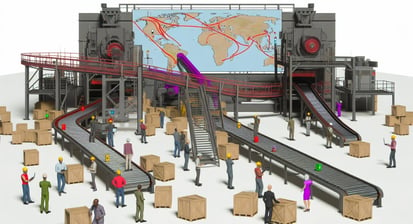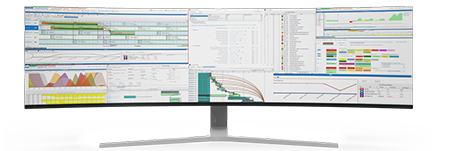Topics: Industrial Manufacturing, Real-Time Data, PlanetTogether Software, Integrating PlanetTogether, Optimized Resource Allocation, Enhanced Collaboration, Improved Accuracy, Dynamic Scenario Planning
In today's industrial manufacturing landscape, supply chain disruptions have become increasingly common. Whether caused by unforeseen global events, supplier issues, or internal challenges, these disruptions can have a significant impact on production schedules and, ultimately, the bottom line. Supply Chain Managers are tasked with the critical responsibility of navigating these disruptions while maintaining efficiency and profitability.
This blog aims to shed light on how Supply Chain Managers can effectively manage production scheduling amidst supply chain disruptions. We'll explore the importance of integration between production scheduling software like PlanetTogether and leading ERP, SCM, and MES systems such as SAP, Oracle, Microsoft, Kinaxis, Aveva, and others. By the end, you'll have a comprehensive understanding of the tools and strategies needed to excel in this complex environment.

Supply chain disruptions can take many forms, from natural disasters to geopolitical tensions and global health crises. These disruptions ripple through the supply chain, affecting the availability of raw materials, production capacity, and transportation logistics. As a Supply Chain Manager, your ability to adapt to these challenges is essential for your organization's success.
Production scheduling plays a pivotal role in managing supply chain disruptions. It involves coordinating resources, machines, and labor to meet customer demand while optimizing costs. The integration of advanced software like PlanetTogether with ERP, SCM, and MES systems becomes the linchpin in this process.
![]()

Integration between production scheduling software and ERP, SCM, and MES systems is a game-changer for Supply Chain Managers. It provides real-time visibility into the entire supply chain, from order placement to product delivery. Let's look into the benefits of this integration:
Real-Time Data: Integrating PlanetTogether with ERP systems such as SAP or Oracle ensures that production schedules are based on the most up-to-date data. This means you can make informed decisions even as supply chain disruptions unfold.
Improved Accuracy: Automation and integration reduce the chances of manual errors in production scheduling. This accuracy is crucial when demand and supply conditions are in constant flux.
Optimized Resource Allocation: MES systems like Aveva can provide insights into machine availability and performance. By integrating this data into your scheduling process, you can optimize resource allocation during disruptions.
Enhanced Collaboration: Collaboration is key during supply chain disruptions. Integration fosters seamless communication between teams, allowing for quick adjustments to schedules and priorities.
Scenario Planning: With integration, you can run "what-if" scenarios to assess the impact of various disruptions and make proactive decisions to mitigate risks.

Now that we understand the importance of integration, let's discuss strategies for effective production scheduling in the face of supply chain disruptions:
Continuous Monitoring: Leverage the real-time data provided by your integrated systems to continuously monitor the status of your supply chain. Set up alerts for critical issues that require immediate attention.
Prioritization: Not all disruptions are equal in their impact. Work closely with your team to prioritize orders and allocate resources accordingly. Make use of advanced scheduling algorithms available in tools like PlanetTogether to achieve this.
Collaboration: Foster collaboration between your production, procurement, and logistics teams. Encourage open communication to swiftly address disruptions and adapt production schedules as needed.
Inventory Management: During disruptions, inventory levels can be a buffer against supply chain volatility. Ensure that your integrated systems provide visibility into inventory levels and trigger automatic reorder points when necessary.
Supplier Relationships: Strengthen relationships with key suppliers and explore options like dual-sourcing to mitigate the risks associated with single-source dependencies.
Employee Training: Equip your workforce with the skills needed to respond to dynamic scheduling changes. Training and cross-training employees can help maintain flexibility in your operations.
Supply chain disruptions are a challenging reality in today's industrial manufacturing landscape. However, with the right tools and strategies in place, Supply Chain Managers can navigate these disruptions effectively. Integration between production scheduling software like PlanetTogether and leading ERP, SCM, and MES systems is a crucial step towards achieving this goal.
By leveraging real-time data, improving accuracy, optimizing resource allocation, enhancing collaboration, and conducting scenario planning, you can not only survive but thrive in the face of supply chain disruptions.
Remember that adaptation and flexibility are key, and the integration of advanced technologies is your greatest ally in this endeavor.
Are you ready to take your manufacturing operations to the next level? Contact us today to learn more about how PlanetTogether can help you achieve your goals and drive success in your industry.
Topics: Industrial Manufacturing, Real-Time Data, PlanetTogether Software, Integrating PlanetTogether, Optimized Resource Allocation, Enhanced Collaboration, Improved Accuracy, Dynamic Scenario Planning
0 Comments
No video selected
Select a video type in the sidebar.







LEAVE A COMMENT